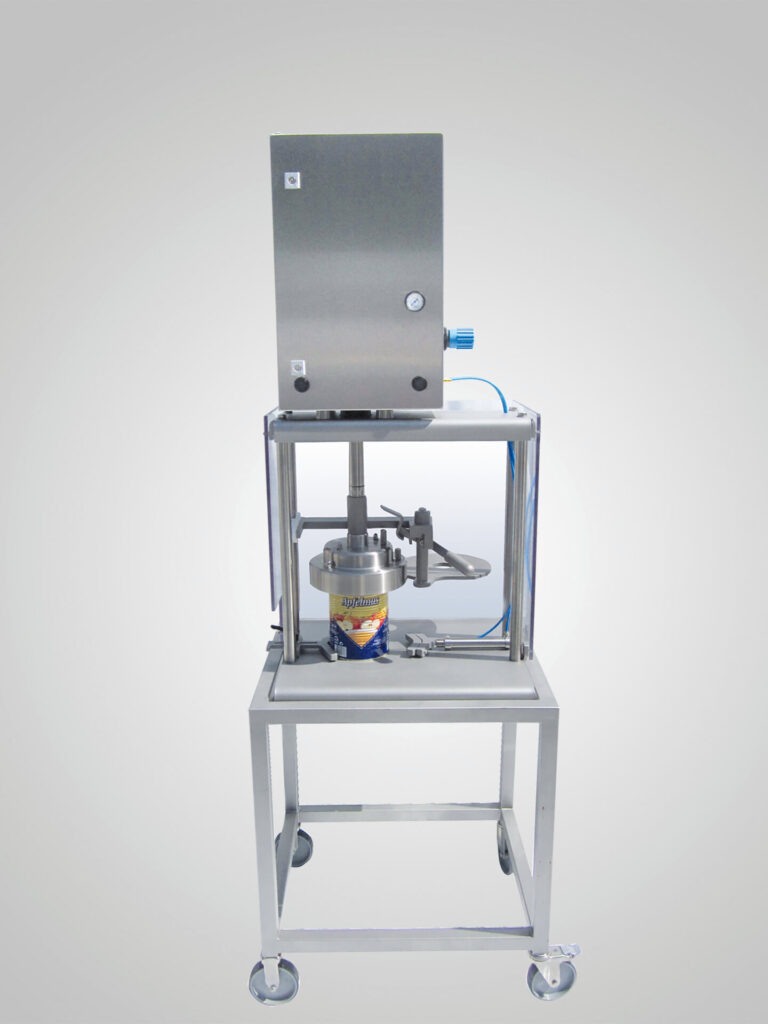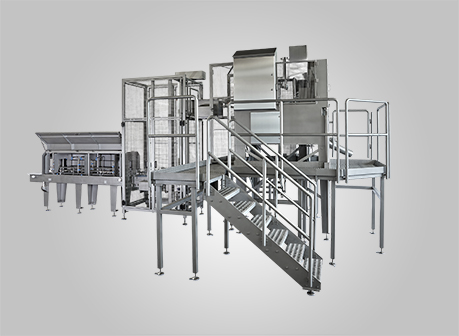Can opening machines
Manual can opener
With the manual machine HDO, the cans are opened via a 2-hand operating control, emptied manually and crushed via the 2-hand operating control.


Fully automatic can opener
Our fully automatic can openers of the CEM series open, empty and crush cylindrical cans. With up to 2200 cans per hour, these industrial can openers are also suitable for integration into processes in the food industry.
More about can opening machines and the tin can
Discover the fascinating world of food cans and can opening machines. From its historical connection to Napoleon to modern industrial applications, this area offers a blend of history, technology and innovation. Find out how these everyday objects continue to play a central role in our food supply.
What does Napoleon have to do with tin cans?
The tin can plays an important role in the everyday life of private individuals. However, its uniqueness has also made it indispensable in the industry. However, only a few people know that it is a real treasure from the past.
Its history began in 1795, when Napoleon offered a prize for the invention of a process for preserving food for his army. The idea of preserving food by heating it in an airtight container came from a Parisian confectioner called Nicolas Appert. He used glass bottles as containers, but this solution quickly proved to be disadvantageous for transportation in the army due to the high risk of breakage and the weight.
The tin can as we know it today, however, goes back to the British Peter Durand. He built on Appert’s idea and brought food into the tin can in 1810, revolutionizing the world. More than two centuries later, the tin can is still irreplaceable.

The tin can: yesterday, today and tomorrow
In the 1990s, people predicted the end of the tin can in the industrial sector. Aseptic filling in large containers seemed to be the future. But over the years, it became clear that the tin can is not so easy to replace. Their advantages are simply too convincing:
- Versatile storage: The tin can allows you to store small quantities of different products. From vegetable ingredients for delicatessen salads and ready meals to fruit for dairies and bakeries and fruit concentrates for the beverage industry – it offers flexibility.
- Safe transportation: Delicate products such as cherries for the dairy, confectionery or bakery industries can only be transported safely in tins.
- UV protection: Compared to plastic bags, the tin can does not allow harmful UV rays to penetrate, which preserves the quality of your products.
- Sustainability: The tinplate can is recyclable and offers an environmentally friendly alternative to plastic packaging.
Advantages of opening with KA-PROCESS can opening machines
- Quality: The chip-free punching of the can end on the CEM 2.0 and HDO-100 offers a safe and efficient solution. Plastic bags have to be cut open manually and run the risk of plastic packaging pieces that are not detectable getting into the product.
- Efficient opening and emptying: Our industrial can openers enable fast and economical opening and emptying.
The tin can remains an indispensable part of our modern world and will continue to play a central role in the future. Trust in our experience and our commitment to excellence.
Canned food in the industrial sector
Industrial food cans differ considerably from the cans available in retail outlets for the end consumer. They are characterized by a larger volume and do not have twist-off closures, additional protective film under the lid or additional plastic lids. Why is that the case? Because large quantities of contents are processed in the industry and fast, efficient opening and emptying are therefore a top priority.
Thanks to advanced technologies in the filling, sealing and opening process, standard cans with predominantly two different can diameters (153 – 157 mm and 230 – 233 mm) have become established in the industry. These specially adapted cans enable the smooth processing of large quantities and ensure the quality and efficiency of industrial production.
The technology behind the tin can
There is more technology behind the industrial tinplate can than you might think at first glance. It is made of tinplate and is usually coated on the inside with food-safe plastic to prevent corrosion. With a sheet thickness of 0.2 to 0.4 mm, it is robust and durable. Reinforcing beading on the jacket, base and lid give it stability. After filling, the can is securely closed by crimping the lid and pasteurized.
Areas of application for industrial can openers
Can opening machines are indispensable in the industrial manufacture of products such as ready-made pizzas, delicatessen salads or fruit concentrates for the beverage industry. Automated can opening systems are able to process a large number of cans in a very short time, which significantly increases the overall production speed.
Requirements for industrial can openers in the food industry
In the modern world of the food industry, can openers play a key role in the efficient processing of canned food. To ensure a dynamic production flow, a number of requirements must therefore be met.
Variety of can sizes
To survive in the food industry, the machines must be able to process the different sizes of cans efficiently. Flexibility in the height and diameter of the cylindrical cans is required.
Different contents
Can opening machines must be able to open cans with different contents. This versatility is crucial as the food industry sources a wide range of raw materials from cans. The contents of canned food can vary greatly and range from chunky to viscous or solid consistencies such as tuna or tomato concentrate. Purees are also common contents of canned food.
The complete removal of the can lid, as with the HDO-100 or the CEM 2.0, is crucial to ensure the integrity of the food and the complete emptying of the cans. Vegetables or fruit in pieces, such as beet, olives, baked beans, pineapple or apricots, require thorough and careful removal of the can lid.
A different process, as used for CEM 1200/2200, is suitable for liquid can contents such as apple sauce or mango pulp. Here it is sufficient to pierce the underside of the can with special punches. The can contents can flow out through the openings.
Cleaning and hygiene
Hygiene is the top priority in the food industry. Thorough cleaning of the machines is of crucial importance. Our machines are designed to be easy to clean and disinfect in order to meet the highest hygiene standards.
Productivity
The machines for opening cans must be able to process large quantities in order to meet the requirements of the industry.
Maintenance and servicing
Regular maintenance and servicing of industrial can opening machines minimizes the risk of production downtime. The HDO-100 and CEM 2.0 are low-maintenance. Nevertheless, preventive maintenance helps to ensure the high availability of the machine.
Integration into the production line
Our machines are designed as self-sufficient, stand-alone machines. However, it is possible to design it as a line in conjunction with a can washing system, a feed conveyor for the full cans, a discharge conveyor for the empty cans and further conveying of the products.
CE certification
Did you know that changes to an existing system may require you to update your CE certification?
The CE marking, which is mandatory for machines and systems in the European Union, ensures that your system complies with the safety and quality standards applicable in the EU. This applies not only to the configuration of your new system, but also to potential future extensions and modifications.
When integrating our conveyor belts or washing systems into your existing KA-Process system, our experienced team is available to support you in testing, updating and obtaining CE certification. This ensures that your entire system meets the highest safety standards.
Chip-free punching of the can end on the HDO-100 and the CEM 2.0
Metal shavings are extremely problematic when opening industrial cans. They jeopardize food safety and impair product quality. If metal shavings get into food, the entire affected batch is usually considered unusable and must be disposed of. This leads to product losses and financial losses for the company.
In the 1970s, a user of our CEM can opening machine commissioned a quality assurance study in which common opening systems such as roller knives, fixed knives and punching crowns were compared.
In all three processes – roller knives, fixed knives and punching crowns – the use of optimally sharpened knives was a basic requirement.
Roller knives and fixed knives
Although the conventional roller and fixed blades were effective, they had some serious disadvantages:
- Metal abrasion on the can seam: The roller knife and also the fixed knife scraped metal off the inner edge of the can when cutting out the lid.
- Abrasion on the outer can seam: The drive gear for feeding the blade scraped metal off the outer can seam with the teeth of the drive roller.
- Precision difficulties: Precisely cutting off the lid after the can had run round was a challenge. A puncture point that was not one hundred percent accurate led to the formation of metal chips.
Punching crowns
With our HDO-100 and CEM 2.0 can opening machines, we enable you to punch can lids without cutting. We use punching crowns for our high-quality can openers to effectively minimize the formation of chips.
- Precision and safety: The lid is punched out precisely approx. 2 mm from the outer edge of the tin. This prevents the above-mentioned problems of roller and fixed knives (positions 1 to 3) and ensures clean opening without chips.
- Regular inspection: To ensure optimum performance, we recommend that you check the punching knife regularly for damage, blunting or bending. In the event of damage due to dented cans or improper handling, the punching crown must be replaced immediately.
- Wear and replacement: Punching crowns are subject to natural wear and should be replaced every 20,000-50,000 cans. We recommend that you always have a complete punching head with support ring, clamping ring and punching knife ready for quick replacement. With an optimally sharpened knife and proper handling of the can opener, you can reduce chip formation to a minimum.
- Metal detection for additional safety: Despite our highly developed technology, we also recommend metal detection with automatic separation after can emptying in order to reliably detect and remove any chips.
Interested? Please ask your questions or request a quote.
